What happens when stocks meet resistance?
Stock-Markets / Financial Markets 2010 Sep 25, 2010 - 06:24 AM GMT New orders for durable goods Decline. - New orders for manufactured durable goods in August decreased $2.5 billion or 1.3 percent to $191.2 billion, the U.S. Census Bureau announced today. Down three of the last four months, this decrease followed a 0.7 percent July increase. Excluding transportation, new orders increased 2.0 percent. Excluding defense, new orders decreased 1.2 percent.
New orders for durable goods Decline. - New orders for manufactured durable goods in August decreased $2.5 billion or 1.3 percent to $191.2 billion, the U.S. Census Bureau announced today. Down three of the last four months, this decrease followed a 0.7 percent July increase. Excluding transportation, new orders increased 2.0 percent. Excluding defense, new orders decreased 1.2 percent.
There’s a Bloomberg article that suggests this is pretty good. Would you agree?
Wal-Mart's CEO Provides a Somber Visual Of The 21st Century Soup Kitchen
(Bloomberg) Scroll down the article…
“Our customer remains challenged,” William Simon, president and chief executive officer of Wal-Mart Stores Inc., the world’s largest retailer, told a Goldman Sachs global retailing conference in New York on Sept. 15. The Bentonville, Arkansas-based company has “to figure out how to deal with what is an ever-increasing amount of transactions being paid for with government assistance.
Midnight Shoppers
“You need not go farther than one of our stores on midnight at the end of the month,” Simon said. “About 11 p.m. customers start to come in and shop, fill their grocery basket with basic items -- baby formula, milk, bread, eggs -- and continue to shop and mill about the store until midnight when government electronic benefits cards get activated, and then the checkout starts.”
What happens when stocks meet resistance?
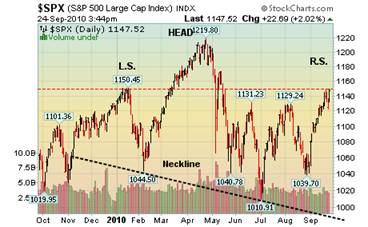 --Beginning on May 5, ICI has reported 20 consecutive weekly outflows from domestic mutual equity funds. The average weekly outflow has been ($3.5) billion. Total outflows in this period are $70 billion. Total outflows YTD are $68 billion. The S&P on April 26th, just before the Flash Crash, was 1219.80. Tuesday it closed at 1148.59, a 5.8% decline despite almost $100 billion of retail outflows. Who’s keeping it up? Not the retail investor. Meanwhile, the right shoulder matches the left. Any idea what comes next?
--Beginning on May 5, ICI has reported 20 consecutive weekly outflows from domestic mutual equity funds. The average weekly outflow has been ($3.5) billion. Total outflows in this period are $70 billion. Total outflows YTD are $68 billion. The S&P on April 26th, just before the Flash Crash, was 1219.80. Tuesday it closed at 1148.59, a 5.8% decline despite almost $100 billion of retail outflows. Who’s keeping it up? Not the retail investor. Meanwhile, the right shoulder matches the left. Any idea what comes next?
Treasury bonds bounce at the trendline.
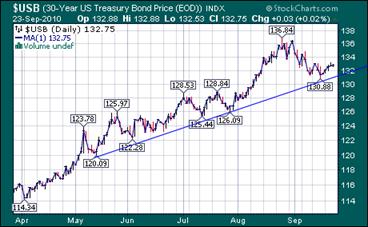 -- Treasuries dropped for the first time in six days. The higher rates are attributed to a better-than-expected Durable Goods Report, although I cannot for the life of me see what is so positive about it. From a technical view, nothing goes in a straight line. Bonds may be re-testing the trendline for support before going higher. Attributing the correction in bonds to a report may be an exercise in futility.
-- Treasuries dropped for the first time in six days. The higher rates are attributed to a better-than-expected Durable Goods Report, although I cannot for the life of me see what is so positive about it. From a technical view, nothing goes in a straight line. Bonds may be re-testing the trendline for support before going higher. Attributing the correction in bonds to a report may be an exercise in futility.
Gold hits $1300.
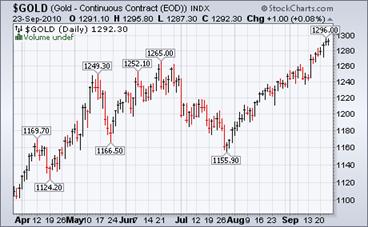 --Gold climbed to a record in London and New York as investors sought a protection of wealth and an alternative to a weakening dollar. Silver rose to the highest price since 1980 in London. Commentators see this as a huge buying opportunity. I suggest that emotions may be running away from common sense.
--Gold climbed to a record in London and New York as investors sought a protection of wealth and an alternative to a weakening dollar. Silver rose to the highest price since 1980 in London. Commentators see this as a huge buying opportunity. I suggest that emotions may be running away from common sense.
Bank of Japan intervenes a second time in the currency market.
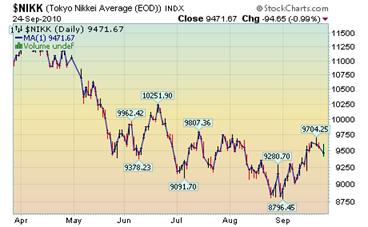 --The yen weakened, snapping a four- day gain versus the dollar, on speculation Japan sold its currency for a second time in a month to protect exporters’ earnings. Asian stocks and oil prices fell on concern the global economic recovery is flagging.
--The yen weakened, snapping a four- day gain versus the dollar, on speculation Japan sold its currency for a second time in a month to protect exporters’ earnings. Asian stocks and oil prices fell on concern the global economic recovery is flagging.
The yen retreated 0.5 percent to 84.87 per dollar as of 4:06 p.m. in Tokyo from 84.38 in New York yesterday, after reaching 85.40 in trading today. Japan intervened on Sept. 15 and Finance Minister Yoshihiko Noda said the government will take “bold” action if necessary.
Shanghai is now the financial capital of the world.
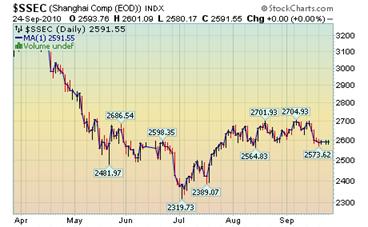 -- (FT) Deals and capital raisings in China’s booming financial services sector have outpaced those in the US for the first time since records began in 1995, fuelled by a wave of refinancing by Chinese banks needing to repair their balance sheets. There have been $36.2bn-worth of deals in China’s financial sector so far this year, compared with $26.2bn in the same sector in the US, according to data from Dealogic.
-- (FT) Deals and capital raisings in China’s booming financial services sector have outpaced those in the US for the first time since records began in 1995, fuelled by a wave of refinancing by Chinese banks needing to repair their balance sheets. There have been $36.2bn-worth of deals in China’s financial sector so far this year, compared with $26.2bn in the same sector in the US, according to data from Dealogic.
The Dollar Declines.
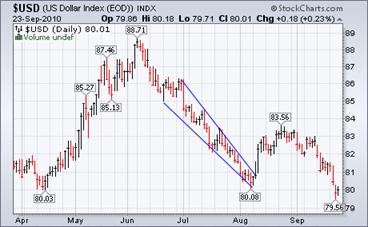 (MarketWatch) The dollar declined against the euro, the Japanese yen and other major currencies Friday, extending losses after a report on durable-goods orders seen as helping boost U.S. economic growth in the third quarter.
(MarketWatch) The dollar declined against the euro, the Japanese yen and other major currencies Friday, extending losses after a report on durable-goods orders seen as helping boost U.S. economic growth in the third quarter.
The greenback fell back against the yen as doubts grew over Japanese authorities’ rumored intervention to sell yen and buy dollars.
The American Dream of Home Ownership Has Become a Nightmare
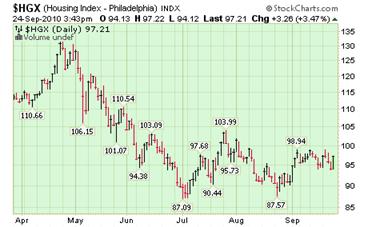 -- (USNews) These days the American dream of home ownership has turned into a nightmare for millions of families. They wake every day to the reality of a horrible decline in the value of the home that has meant so much to them. The pressure to meet mortgage payments on homes that have lost value has been especially shocking—and unjust—for the millions of unemployed through no fault of their own... They just cannot afford to abandon the equity they have in their homes—and they can't sell in this miserable market.
-- (USNews) These days the American dream of home ownership has turned into a nightmare for millions of families. They wake every day to the reality of a horrible decline in the value of the home that has meant so much to them. The pressure to meet mortgage payments on homes that have lost value has been especially shocking—and unjust—for the millions of unemployed through no fault of their own... They just cannot afford to abandon the equity they have in their homes—and they can't sell in this miserable market.
Retail Gasoline prices ease, but higher than last year.
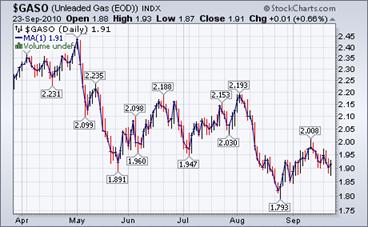 --The Energy Information Agency weekly report observes, “At $2.72 per gallon, the U.S. average price for regular gasoline was virtually unchanged from last week but was $0.17 above last year at this time. Regional price changes were mixed; the East Coast price moved 2 cents higher to $2.64 per gallon and the Midwest average decreased 3 cents to $2.75 per gallon.”
--The Energy Information Agency weekly report observes, “At $2.72 per gallon, the U.S. average price for regular gasoline was virtually unchanged from last week but was $0.17 above last year at this time. Regional price changes were mixed; the East Coast price moved 2 cents higher to $2.64 per gallon and the Midwest average decreased 3 cents to $2.75 per gallon.”
Natural gas prices are not threatened by storms.
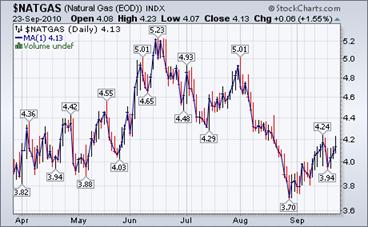 -- The U.S. Energy Information Administration reports, “Natural gas prices fell at the majority of market locations since last Wednesday, as moderating temperatures early in the week eased cooling demand for natural gas, domestic natural gas production remained robust, and the tropical storm threats posed by Igor, Julia, and Karl passed without incident.”
-- The U.S. Energy Information Administration reports, “Natural gas prices fell at the majority of market locations since last Wednesday, as moderating temperatures early in the week eased cooling demand for natural gas, domestic natural gas production remained robust, and the tropical storm threats posed by Igor, Julia, and Karl passed without incident.”
Fed Speak Friday - Volcker, Lacker and Ben Batting 1, 2, 3
(ZeroHedge) What a fun day for debate!
Former Fed Chair, Paul Volcker went way off-script in Chicago yesterday and "moved unsparingly from banks to regulators to business schools to the Fed to money-market funds during his luncheon speech. He praised the new financial overhaul law, but said the system remained at risk because it is subject to future “judgments” of individual regulators, who he said would be relentlessly lobbied by banks and politicians to soften the rules."
“This is a plea for structural changes in markets and market regulation,” he said at one point.
White Paper On What The SEC Will Likely Recommend In Response To The Flash Crash
(ZeroHedge) Themis trading has submitted a white paper suggesting what the four distinct steps the SEC may take as a response to a sudden surge in complaints against pervasive and uncontrollable HFT market manipulation. These are as follows: i) Alter the existing single stock circuit breaker to include a limit up/down feature; ii) Eliminate stop-loss market orders; iii) Eliminate stub quotes and allow one-sided quotes (a stub quote is basically a place holder that a market maker uses in order to provide a two-sided quote), iv) Increase market maker requirements, including a minimal time for market makers to quote on the NBBO. We believe option 4 would be the most applicable, yet most retail investors will likely be most interested by the elimination of the traditional stop loss option that has become a staple in retail investing.
This bears repeating…stop losses will not protect you in a flash crash!
Grayson Sends Letter To Fannie CEO Demanding Explanation To Company's Actions Vis-A-Vis Pervasive Mortgage Fraud
(ZeroHedge) Alan "Taz" Grayson is back again, and asks some very relevant questions of Fannie's CEO Michael Williams:"Why is Fannie Mae using lawyers that are accused of regularly engaging in fraud to kick people out of their homes? Given that Fannie Mae is at this point a government entity, and it is the policy of the government that foreclosures are a costly situation best avoided if there are any lower cost alternatives, what steps is Fannie Mae taking to avoid the use of foreclosure mills? What additional steps is Fannie Mae going to take to ensure that foreclosures are done only when necessary and only in accordance with recognized law? How do your servicer guidelines take into account the incentives for fraud in the fee structure of foreclosure attorneys and others engage in the foreclosure process? What mechanisms do you employ to monitor legal outsourcing?" He almost asks the correct one: "Is Fannie (and Freddie) a shell operation to willfully and illegally transfer non-existent deeds to servicer banks so they can collect subsequent cash flows associated with misappropriated properties, while receiving tens of billions in taxpayer funding each and every quarter."
The Bastard Child Of The Mother Of All Bubbles
(ZeroHedge) There is no doubt the home price bubble inflated by Easy Al Greenspan between 2000 and 2006 was the Mother of All Bubbles. Robert Shiller clearly showed that home prices were two standard deviations above expectations. Despite the unequivocal facts that Dr. Shiller put forth, millions of delusional unsuspecting dupes bought houses at the top of the market. These were the greater fools. They actually believed the drivel being spewed forth by the knuckleheaded anchors on CNBC. They actually believed the propaganda being preached by David Lereah from the National Association of Realtors (Always the Best Time to Buy) about home prices never dropping. They actually believed Bennie Bernanke when he said:
“We’ve never had a decline in house prices on a nationwide basis. So, what I think what is more likely is that house prices will slow, maybe stabilize, might slow consumption spending a bit. I don’t think it’s gonna drive the economy too far from its full employment path, though.” – 7/1/2005
“Housing markets are cooling a bit. Our expectation is that the decline in activity or the slowing in activity will be moderate, that house prices will probably continue to rise.” – 2/15/2006
Unfortunately, it appears that housing may decline much more than the chart in the article reveals.
Traders alert: The Practical Investor is currently offering the daily Inner Circle Newsletter to new subscribers. Contact us at tpi@thepracticalinvestor.com for a free sample newsletter and subscription information.
Our Investment Advisor Registration is on the Web
We are in the process of updating our website at www.thepracticalinvestor.com to have more information on our services. Log on and click on Advisor Registration to get more details.
If you are a client or wish to become one, please make an appointment to discuss our investment strategies by calling Connie or Tony at (517) 699-1554, ext 10 or 11. Or e-mail us at tpi@thepracticalinvestor.com .
Anthony M. Cherniawski, President and CIO http://www.thepracticalinvestor.com
As a State Registered Investment Advisor, The Practical Investor (TPI) manages private client investment portfolios using a proprietary investment strategy created by Chief Investment Officer Tony Cherniawski. Throughout 2000-01, when many investors felt the pain of double digit market losses, TPI successfully navigated the choppy investment waters, creating a profit for our private investment clients. With a focus on preserving assets and capitalizing on opportunities, TPI clients benefited greatly from the TPI strategies, allowing them to stay on track with their life goals
Disclaimer: The content in this article is written for educational and informational purposes only. There is no offer or recommendation to buy or sell any security and no information contained here should be interpreted or construed as investment advice. Do you own due diligence as the information in this article is the opinion of Anthony M. Cherniawski and subject to change without notice.
Anthony M. Cherniawski Archive |
© 2005-2022 http://www.MarketOracle.co.uk - The Market Oracle is a FREE Daily Financial Markets Analysis & Forecasting online publication.



